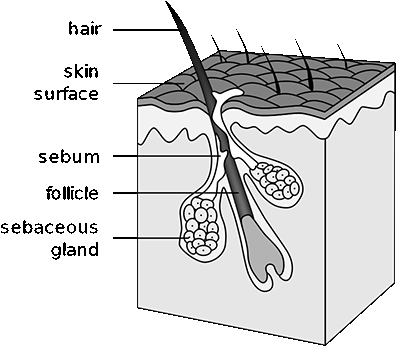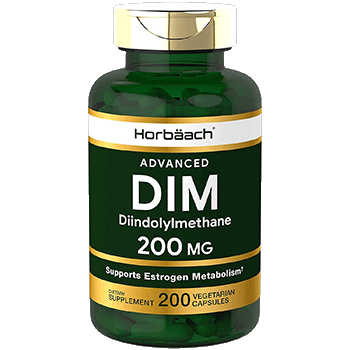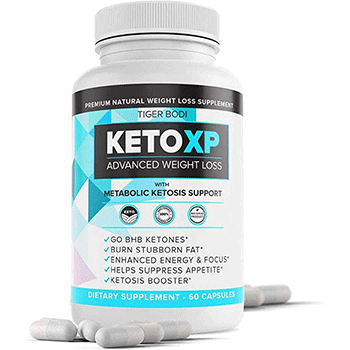Hormones don’t just control the way you feel. They also control the way you look – more specifically how your skin looks.
Sometimes it feels like your skin just isn’t part of your team – it breaks out with acne, your puffy eyes give away the little sleep you’ve had in the last 3 nights, and so on.
If you see acne on your skin, it’s telling you something is probably off inside, and it’s usually related to hormones.
Research shows it’s easier and better to treat acne without antibiotics and creams (1, 2). Before you rush to get some skin cream or cosmetic, maybe you’ll get better results if you balance your hormones first!
We’ll look at certain conditions that affect your skin health, and hopefully help provide answers that may help you maintain a smooth healthy skin.
Remember that skin types vary with people, and even your skin also changes as you age.
Skin Changes During Menstrual Cycle

The skin contains sebaceous glands, which secretes an oily substance called sebum. Sebaceous glands increase in size around puberty, with the most sebum secreted around age 35.
Sebaceous glands are influenced by hormones called androgens (such as testosterone – “male hormone”) to produce more sebum, which may progress to acne. This is because sebum-filled pores are the ideal place for bacteria to live—particularly P. acnes, which loves to colonize these pores, and further worsen and causes inflammatory acne.
On the other hand, estrogen (“female hormone”) suppresses sebum production. Estrogen is associated with increased production of collagen, which results to more skin thickness, skin hydration, wound healing, and improved barrier function.
Sometime before the menstrual period starts (around 10 days), there isn’t enough estrogen, to counter over-production of sebum. Other theories suggest there’s an imbalance of estrogen to progesterone ratio. This leaves a higher level of androgens, which lead to more sebum production, leading to acne.
You may notice differences in acne outbreaks, elasticity and wound healing ability at different times in your cycle. You may also notice dry skin when estrogen levels are low.
Key Takeaway:
In women who suffer from hormonal acne, the level of estrogen falls too low in relation to progesterone. This un-checked progesterone promotes too much sebum production, which leads to acne.
Skin Changes As You Age
Estrogen levels start to decrease even before menopause. As we’ve seen, estrogen helps to stimulate the right amount of oil production to keep it supple, smooth, and plump.
But as estrogen decreases with age, your skin gets drier and itchier.
Your doctor may advise you to get on hormone therapy, by taking hormones, usually estrogen and progesterone.
You may also consider supplementing with V. agnus-castus and DIM to regulate your hormonal balance.
Introducing DIM Supplement
What Is DIM?
DIM is a plant compound derived from cruciferous vegetables (e.g. cabbage, broccoli, cauliflower, etc.). It has picked up steam as a go-to treatment for maintaining estrogen and testosterone balance, and as an anti-cancer agent (24, 25).
It’s known to treat a variety of issues such as acne, PMS, PCOS, fibroids, menopause symptoms, weight loss, lean body mass, and prostate health, as well as a horde of other benefits.
To get the maximum benefit of DIM, you’d need to eat a kilo of these vegetables every day (26).
For this reason you need to take the supplement to get the optimum amount of DIM.
Polycystic Ovary Syndrome (PCOS) & Acne
Women with PCOS produce a lot of androgens (such as testosterone) , as well as the hormone that breaks down glucose. This results to irregular or prolonged periods, acne and excess hair on your lip and chin (beards).
If you’re overweight, reducing weight may be your first option to consider. Exercise has also been shown to improve PCOS symptoms.
Consider a keto diet as well as keto supplements and supplements to control hormonal changes such as DIM and V. agnus-castus.
Introducing KETO XP Supplement
- Is formulated with BHB to get your body into ketosis fast and use fat as primary source of energy
- Stops excess fat production
- Suppresses your appetite
- Increases energy levels, improves sleep and prevents fatigue
- The result is lower weight, lower percentage of body fat and a higher percentage of non-fat mass.
Perimenopause And Menopause

During perimenopause and menopause, estrogen levels decrease. This causes dryness in the skin. The skin may also feel itchy and uncomfortable during this time.
Along with reduced hydration, low collagen levels are involved with the breakdown of collagen and elastin, the two proteins that give skin its structure.
This dryness and loss of collagen lead to a saggy, wrinkled skin.
Consider supplementing with DIM and Collagen to manage these conditions.
Introducing Super Collagen Supplement
What Is Super Collagen Supplement?
Super Collagen:
- Promotes A Smooth, Soft, Youthful, Healthy Skin
- Boosts Muscle Mass
- Relieves Joint Pain & Promotes Joint Health
- Keeps Bones Strong
- Promotes Heart Health
- Prevents & Reverses Cellulite And Stretch Marks
- Improve Hair & Nails
- Can Improve Gut Health
- Can Help In Weight Loss
- May Help Alleviate Anxiety
- May Help With Better Sleep
- Helps Support Teeth & Gums
GOT QUESTIONS?

Get A Free Expert Consultation
Navigating supplements without professional help can be expensive and dangerous. We are here to help.
There’s no obligation.
Diet And Lifestyle Solutions To Hormonal Skin Problems
Here are a few lifestyle choices that can help you reduce skin conditions:
- Get plenty of sleep
- Maintain a balanced diet
- Exercise regularly
- Avoid smoking
- Reduce alcohol consumption
- Avoid stress – stress can affect cortisol levels, which can lead to flares of acne
- Increase intake of magnesium – when cortisol levels rise, the body uses up a lot of magnesium.
Summary:
In general, if there’s a hormonal link to your skin problems, getting your hormones back in balance is the way to go.
Even though you may also apply some skin creams, fixing hormonal balance may be a more long-term solution





